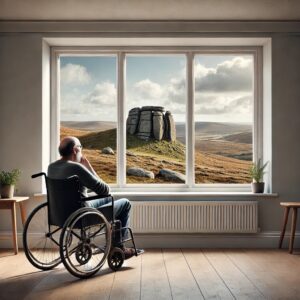My Journey as the Family’s “Black Sheep”
Introduction
 As the “black sheep” of my family, I’ve often felt isolated or misunderstood from an early age, with a unique sensitivity and curiosity that sets me apart. I have a knack for seeing family dysfunction more clearly, which drives me to heal from past wounds and engage in deep self-reflection. This difference makes me stand out in my family, and often, it also means I’m seen as the scapegoat.
As the “black sheep” of my family, I’ve often felt isolated or misunderstood from an early age, with a unique sensitivity and curiosity that sets me apart. I have a knack for seeing family dysfunction more clearly, which drives me to heal from past wounds and engage in deep self-reflection. This difference makes me stand out in my family, and often, it also means I’m seen as the scapegoat.
Early Years
From a very young age, I felt like an outsider within my own family—misunderstood, often alone, and grappling with a sense of difference I couldn’t quite place. I was always more sensitive, more curious, and more willing to explore things deeply than those around me. This sensitivity, while a strength in many ways, sometimes made family dynamics even harder to bear. I could see unspoken resentments that others either couldn’t or wouldn’t acknowledge. It created a tension that, in some ways, I felt was mine alone to carry.
Challenges and Adversity
 Though I saw things clearly, I was far from perfect. I faced intense bullying in school, which left lasting scars and affected my grades, resulting in poor academic performance. After school, I sought to build a career and gain experience in my professional field. Unfortunately, I encountered an older man in a position of power who took advantage of my ambitions. He manipulated and blackmailed me into regular payments, leading to bounced cheques and, at a young age, a prosecution that further stained my early years. This marked me and irreversibly permanently wrecked relationships with my wider family. Despite these experiences, I persevered, ultimately carving out a very successful career that I’m proud of today.
Though I saw things clearly, I was far from perfect. I faced intense bullying in school, which left lasting scars and affected my grades, resulting in poor academic performance. After school, I sought to build a career and gain experience in my professional field. Unfortunately, I encountered an older man in a position of power who took advantage of my ambitions. He manipulated and blackmailed me into regular payments, leading to bounced cheques and, at a young age, a prosecution that further stained my early years. This marked me and irreversibly permanently wrecked relationships with my wider family. Despite these experiences, I persevered, ultimately carving out a very successful career that I’m proud of today.
Mistakes and Reflection
Looking back, I recognise the mistakes I made during these difficult times. At one point, my late father asked me if I was being harassed or bullied by this older man who was known to my parents. Despite everything, I denied it and lied to my dad, somehow feeling compelled to protect the very person who had caused me so much harm. This protective instinct was difficult to understand then, and it’s something I still reflect on today.
In my later years, after building a successful public career, I felt a strong urge to confront the past and expose this man for his actions. I had finally found the strength to face that chapter and hold him accountable. But when I attempted to do so, I discovered it was too late—he had already passed away. This realisation left me with mixed emotions, but ultimately, it reinforced my belief in moving forward and finding peace within myself.
Becoming the Scapegoat
As I grew older, this ability to see things more clearly came with ups and downs. On the one hand, it gave me insight and resilience, a chance to understand myself and the people around me on a deeper level. On the other, it often felt like I was swimming against the current. I became the family’s go-to scapegoat, a place to direct frustrations and unresolved issues. Instead of addressing their own struggles, family members seemed to project them onto me, a burden that left me feeling both hurt and alienated. It took me years to understand that I wasn’t the root of these issues—that the underlying dynamics had been deeply embedded long before I could even comprehend them. I’d come to realise that tensions with certain family members existed well before I was born. Sometimes, they surfaced in my parents’ early married arguments, their raised voices filtering upstairs after my bedtime. One night, I overheard one of them say, “I wish we never had him,” directed at me as a young quiet, shy child in primary school. This happened several times. I would cry myself to sleep, wrestling with the hurtful realisation that the very person who brought me into the world might feel that way. Yet the next day, there was no mention, no apology—just business as usual.
Growing Self-Reliance
 This responsibility, though heavy, forced me to develop a strong sense of independence. From a young age, I realised that I couldn’t depend on others to meet my needs or support me through difficulties. Learning to rely on myself taught me to embrace my own strength and resilience, even when I felt alone. It became clear that I had to take care of myself in ways that others did not.
This responsibility, though heavy, forced me to develop a strong sense of independence. From a young age, I realised that I couldn’t depend on others to meet my needs or support me through difficulties. Learning to rely on myself taught me to embrace my own strength and resilience, even when I felt alone. It became clear that I had to take care of myself in ways that others did not.
Positives of Being the “Black Sheep”
But being the “black sheep” has had its positives too. This journey has deepened my empathy and insight and made me unafraid to confront difficult truths. I feel things profoundly, which can be painful, but it also allows me to understand and appreciate the world in ways that others may overlook. While my family might find it easier to stay emotionally closed off, I’ve learned to embrace my openness. I’m not afraid to self-reflect or face the challenges that others avoid, and though it’s been difficult, I wouldn’t trade that ability for anything.



